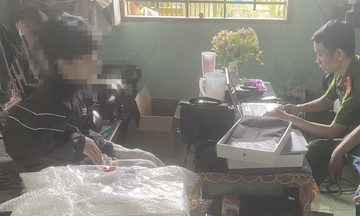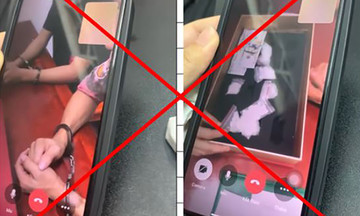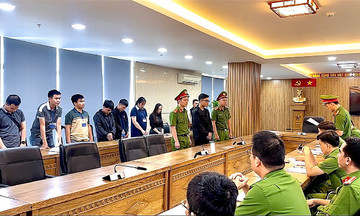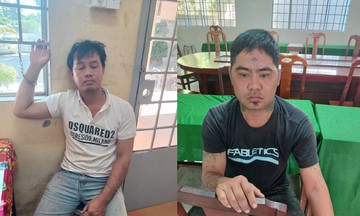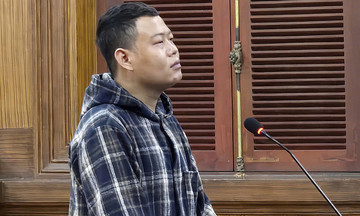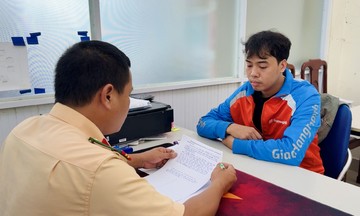On 10/7, the People's Court of District 1, Ho Chi Minh City, heard a credit card dispute between plaintiff Nguyen Tran Hung Long (the primary cardholder) and defendant Citibank.
Nguyen Phi Hung (the authorized user of the credit card) and UOB (which acquired Citibank's retail banking operations) were identified as related parties.
The case revolves around a credit card theft that occurred while Mr. Long and Mr. Hung were traveling in the US in 2024. Mr. Long had opened two credit cards with Citibank in 2013, one for himself and a Mastercard supplementary card for Mr. Hung. On 11/2/2024, their wallets, containing the Citibank cards and cards from another bank, were stolen. Mr. Hung soon discovered two unauthorized transactions on his supplementary card totaling over 4,900 USD (nearly 127 million VND).
Mr. Hung immediately notified Citibank and the Los Angeles police. He requested that the transactions, which were still pending, be blocked. However, Citibank approved the transactions 4 days later, on 16/2.
Upon returning to Vietnam, Mr. Hung and Mr. Long contacted Citibank to dispute the charges, but the bank insisted they pay. Fearing damage to their credit history, they reluctantly paid the 127 million VND.
Mr. Long argued he was not responsible for the fraudulent transactions and repeatedly requested a refund from Citibank. After his requests were denied, he filed a lawsuit seeking reimbursement of the 127 million VND, plus 9 million VND in interest and 18 million VND for emotional distress.
Citibank argued that as of 1/3/2023, they had transferred their retail banking operations to UOB, with the approval of the State Bank of Vietnam. They claimed Mr. Long was no longer their customer and UOB was responsible for any transactions after that date. Citibank requested the court to dismiss the case, claiming Mr. Long had sued the wrong party.
Mr. Long and Mr. Hung countered that all their interactions, including opening the card, using it, and communicating via email, hotline, and the mobile app, were under the Citibank brand. They believed they were dealing with Citibank. "I repeatedly confirmed via email that I didn't make those fraudulent transactions. The bank's response that the transactions were not fraudulent was insulting and upsetting," Mr. Hung said. He added that the other bank whose card was stolen had promptly refunded the fraudulent charges after he reported the theft.
Mr. Long's lawyer, Ngo Qui Linh, argued that the internal transfer between Citibank and UOB should not burden the customer. He claimed UOB had not sent any confirmation to Mr. Long, violating regulations on the transfer of obligations. He cited Articles 369 and 370 of the 2015 Civil Code regarding the transfer and inheritance of rights and obligations, arguing the contract between Mr. Long and Citibank remained valid because UOB hadn't notified Mr. Long of their responsibility for transactions on the Citibank card. He also cited Circular 19/2016 of the State Bank of Vietnam and its amendments, emphasizing the bank's duty to protect customers. "The customer reported the loss and requested to block the transactions while they were still pending, but the bank failed to act. This justifies the lawsuit," Mr. Linh said.
Citibank's lawyer maintained the transfer was legal and that Mr. Long had been notified and agreed to it. They pointed to emails mentioning the transfer to UOB and Mr. Long's continued use of the service without objection. They insisted Mr. Long should sue UOB, not Citibank.
A UOB representative confirmed they assumed Citibank's retail banking operations and customers on 1/3/2023. They explained that due to an agreement, Citibank's contact information and logo were still used during the transition period. UOB argued the responsibility for protecting the card lay with the customer and, since the fraudulent transactions occurred before the theft was reported, the cardholder was liable. UOB disagreed with the lawsuit.
After hours of deliberation, the court dismissed Mr. Long's case. The court cited documentation showing Citibank had completed the transfer to UOB in 3/2023 with the State Bank of Vietnam's approval. Citibank had notified Mr. Long on 10/3/2024, and the fraudulent transactions occurred after the transfer. The court explained the legal implications of the transfer, but Mr. Long maintained his claim. Furthermore, Mr. Long did not provide evidence that UOB had refused to address his complaint. The court advised him to file a new lawsuit against UOB.
Prior to the trial, journalist Hai Duyen presented a press card but was asked for a letter of introduction by the presiding judge, Hoang Thi Anh. After providing the letter, the judge questioned the journalist about their knowledge of the case. The judge then consulted with the People's Procuracy representative, who argued that while journalists can attend public trials, they should notify the court in advance. The representative suggested denying the journalist access, without providing any legal basis. Article 21 of the 2015 Civil Procedure Code states that the People's Procuracy oversees legal compliance during trials. After nearly two hours, the judge allowed the journalist to attend, stating the trial was public and contained no confidential information.




